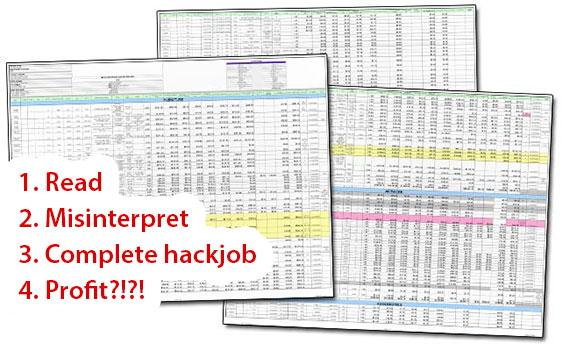Stop Wasting Money! Start Hoarding Data
Affiliate marketing arbitrage is one of the simplest careers in the world. There are no politics, no glass ceilings, and no barriers to entry. The focal point of 99% of what we do is numbers. Can you make them work for you?
From CPCs to EPCs, from CPMs to CTRs… what may appear to the uninitiated as random digits on a screen, can be optimised and manoeuvred in to a recipe for serious, serious moo-lah. But only if you know how to work them. And thankfully most people don’t.
The EPC Spreadsheet
Many affiliate networks distribute spreadsheets of their top performing offers, complete with EPCs, conversion rates and ranking by revenue.
Affiliates seem to love these documents, despite the warped data they can represent. It doesn’t take a genius to work out that if 50 new publishers are direct linking one offer, while 5 veterans are pre-selling another, the EPCs are going to look favourable for the pre-sold offer. We take a lot of this bias for granted in the pursuit of easily consumable golden nuggets.

EPC spreadsheets are good for ruling out dud offers, and a welcome helping hand for deciding where to start, but they are not an accurate representation of how your marketing will perform.
If you run a lot of campaigns, and particularly if you are an adopter of the ‘throwing shit at the wall’ technique, I suggest creating your own performance spreadsheets.
In short: Learn to make use of your data.
You pay for it. You bust your balls for it. Why waste it?
If affiliate marketing is all about numbers – and it is – then failing to stockpile your data should be seen as a karate cock slappable offence.
With every campaign, you can store data on multiple levels.
Country Specific Data
I have a file for every single country that I advertise in, as well as an Excel spreadsheet with an overview of the key points I need to remember.
In the spreadsheet I aim to correlate some baseline metrics for each country based on the hundreds of thousands of dollars I have spent arbitraging my damn hairline away.
Metrics such as:
- The best offer in that country, by EPC
- The second best offer, by EPC
- Average CPM/CPC to draw traffic from each of my favourite traffic sources
- Average landing page CTR (some countries can be bashed for 70%, whilst others are tough to optimise beyond 35%). No idea why. That’s why it’s important to take notes.
Note: Media buyers should have doubts about running a campaign if the gulf in performance between best and second best offer is enough to eat up most of their profit. Have a Plan B, or stick to low-risk marketing on self-serve platforms.
There’s no shame in being a one trick pony, and there’s no sense in being an over-confident donkey who just blew $15,000 on a campaign that has no viable Plan B.
My countries overview spreadsheet is a permanent fixture on my desktop.
How many times do you find yourself surfing through new traffic sources, checking out the minimum bids and running calculations in your head to see if you might get profitable? Get that data out of your head and on to paper.
I will say it again: affiliate marketing is all about the numbers.
If you get in to the habit of recycling your data and archiving it for future reference, you will soon find that there is no such thing as a failed campaign. Only more numbers. Numbers that will lower the risk, and the uncertainty, of your next investment.
There are two forms of filing that can also help you.
Digital archiving
What do you do with those landing pages and creatives once you’ve pushed them through the FTP?
I used to let them fester on my desktop before eventually click-and-dragging in to a spiralling abyss marked ‘To Sort‘, one day to be found a dozen archives deep.
I’ve since got in to the habit of storing every single landing page in a country coded folder. If you start this today, you are unlikely to see immediate benefits. But six months down the road you will have enough assets to move quickly in to just about any market in the world.
Naturally, a good labelling system is vital. 1001 folders titled ‘LP1‘ are more trouble than they are worth. Name your landing page variations accordingly. For example: Rules, Qualifier, Short Sell, Sales Letter, Squeeze, and so on…
If you are particularly adventurous, you will have multiple sub-variants inside each folder. Again, name them based on their distinguishing qualities. Future You will be grateful, unlike 2011 Me, who spent many hours fishing through his Trash Can looking constipated.
Paper archiving
Besides the overview spreadsheet and the digital files, I keep a paper record of every single country that I advertise in. As you might imagine, some are thicker than others. Australia is starting to resemble a J.K. Rowling brainfart, whilst a stiff breeze sends China in to my laundry basket.
What do I store in the paper files?
A whole raft of miscellaneous information, such as:
- Print outs of successful creatives
- Printed mind maps of available offers matched to networks (Get MindNode)
- Email correspondence with affiliate managers
- Skype conversation transcripts from networking sessions
- Related forum posts, case studies and follow alongs (Join STM)
- Cheat sheets of common language translations so I can understand my own ads (surprisingly helpful!)
- Popular local slang terms
You could probably do this shit in Evernote, but I like the smell of paper.
Every single campaign you run is a haven for data and insights that can be tucked away and referred to in the future. Some of those insights will be relative to a traffic source, others to a country, and lots will be to a particular offer or creative approach. If you are the kind of affiliate who regularly gorges on network EPC spreadsheets, there’s very little excuse for placing less value in the data that you bought.
Data is no guarantee of success
Affiliates are pretty lousy at predicting how their campaigns will perform. This is a damn near universal trait.
I thought it was just me; a bumbling fool in an ocean of wizard mathematicians. But no, having sat through my share of mastermind sessions recently, I can say with confidence that many of you are just as bad. Collectively we project numbers about as accurately as ReBumberclart Republican Karl Rove on Election Night.
Nate Silvers, we ain’t.
Let’s see…
You’ve spotted that you can snap up 200,000 impressions per day at a CPM of $0.70 and you hope that with a combined ad CTR of 0.25%, a landing page CTR of 30% and a conversion rate of 1/10, you’ll be enjoying a 100% ROI.
You’ve gone so far as to multiply your $140/day profit by 30, and have tentatively pencilled ‘$4200‘ next to a sketch of ‘JUNE‘ with doodles of the cocaine and hookers that you’ll buy with the harvest.
Initial estimates are fine. But don’t kid yourself. You are not going to have an accurate idea of the true numbers until you bite the bullet and go live. And it’s usually at this point that most of us scrunch up those hopeful projections, launching them in to the office bin while snarking viciously:
“How was I to know my CTR wouldn’t nudge past 0.06%?”
“A 3% conversion rate? Are you shitting me? No? Are you SCRUBBING me?”
If you place too much trust in your estimated numbers, you will find yourself so disenfranchised at the end of Day 1 that there’s a good chance you’ll have abandoned ship before the weekend. That’s how money gets wasted and confidence wanes.
Data spreadsheets and detailed files can help to rein in your focus. But they will not perform miracles, and they will not turn your brainfarts in to fairy dust.
There’s a famous quote from Thomas Edison:
“Genius is 1 percent inspiration and 99 percent perspiration.”
Naturally, like any wise bastard from years gone by, his words have been passed through memos and mutilated on blogs to the point where you’re just as likely to recognise them as:
“Genius is 20 percent my balls and 80 percent my balls.”
Well, I’m more of a Pareto Principle kinda guy.
It’s tough to say how much of an affiliate’s success stems from genius. But I do know that moments of creative brilliance are rare, and data is not.
Many affiliates carry around their stats as a burden; a constant reminder of how wrong they can be. The best affiliates bounce off their data not as crushing evidence of an initial bad judgment, but as vital signposts for where they need to improve. Sometimes the signal gets lost in the emotional sting of losing money. C’est tragique, now get over it.
You can make a lot of money by applying basic data-driven principles to very ordinary advertising. It’s not rocket science. And the next time somebody asks me what I do for a living, that’s exactly what I won’t tell them.



Young affiliate marketers are number one pray for Thai pros these days. Go for it! Best place and way to…